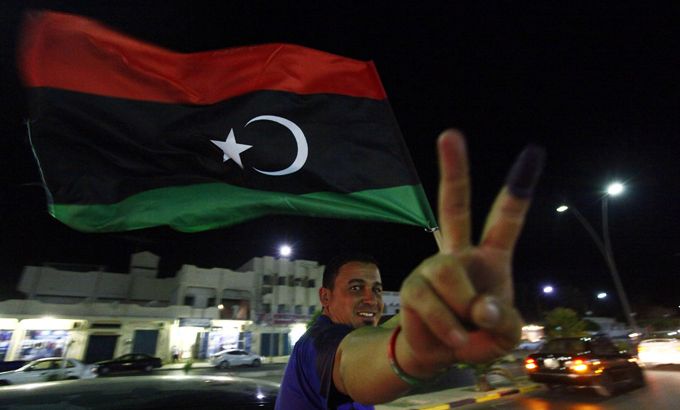Libya’s liberals claim early election lead
Rival party and media reports concur with claim of early advantage from National Forces Alliance.

A major liberal party in Libya has claimed an early lead in the first free election since the toppling of dictator Muammar Gaddafi, a vote that will choose the assembly tasked with writing the country’s new constitution.
Early reports on Sunday showed that the National Forces Alliance (NFA), a coalition led by former prime minister Mahmoud Jibril, is leading the polls, said Faisal Krekshi, the coalition’s secretary general.
Jibril, who played a prominent role as rebel prime minister during the popular revolt that toppled Gaddafi last year, resigned his position in October.
In a press conference on Sunday night, Jibril said his party would not continue commenting on how well they were faring in the poll and stressed that the alliance was not secular or liberal but a national unideological coalition. Jibril said he was also open to forming a coalition government with other parties.
The leader of one of Libya’s main Islamist parties also acknowledged that the NFA had the advantage in the country’s two largest cities.
“The National Forces Alliance achieved good results in some large cities, except Misrata. They have a net lead in Tripoli and in Benghazi,” said Mohamed Sowan, who heads the Justice and Construction Party, which is connected to the Muslim Brotherhood.
Sowan, a former political prisoner and member of Libya’s Muslim Brotherhood, added that his party had a lead in the south of the country as well.
Final results are not expected until Wednesday at the earliest.
The lead-up to the vote was marred by limited violence in the east, where protesters have pushed for a stronger federal system and complained about an uneven distribution of seats in the new assembly.
On Sunday, Jibril said the east’s demands were legitimate, since the region had been neglected under Gaddafi, and that differences needed to be resolved through talks.
Strong turnout
On Saturday, Libyans across the country voted to elect members of the new General National Congress, a 200-member legislative assembly that will steer the country through a transition period.
Turnout was above 60 per cent, the electoral commission said.
A total of 80 seats in the incoming congress are reserved for political entities, while the remaining 120 are held for individual candidates, some of who are openly allied to specific parties.
Altogether, 3,707 candidates stood in 72 districts nationwide.
Sowan told the AFP news agency that the results were hard to determine due to a network of allied parties and sympathisers running as individual candidates.
Adding to the uncertainty, votes are still being tallied by Libya’s electoral commission.
The world is waiting to see whether Libya, a conservative Muslim country with no significant minorities and many powerful tribes, will deliver a win for conservative Islamic parties as in neighbouring Egypt and Tunisia.
Unofficial tallies
On Sunday, election commission chief Nuri Abbar condemned the speculation by candidates and local media about the polling results.
“I don’t want to waste time responding to these false reports. There are no indications that the [National Forces Alliance] is ahead. These so-called exit-polls are confusing because the final results may differ”, he said at a press conference. “I will not give a final date on which we will announce the final results because many factors are beyond our control.”
He said more than 1.7 million people voted and that the number was expected to increase after eight polling centres that closed due to security concerns reopened on Sunday.
From the beginning, the National Forces Alliance stood alongside and two Islamist contenders, the Justice and Construction and Al-Watan parties, as major forces.
Private channel Al-Assima TV reported overnight that the liberal coalition was well ahead in the capital, taking 80 per cent in the district of Tripoli Centre and 90 per cent in the impoverished district of Abu Slim.
Its edge, the channel said, was also large in the east, with preliminary figures giving it 70 per cent in Benghazi and 80 per cent in Baida, the hometown of Mustafa Abdel Jalil, the chief of the National Transitional Council that steered rebels through months of struggle.
All the figures remain unofficial.
“Some disturbances”
Alexander Graf Lambsdorff, who heads a team of 21 European Union observers, said large numbers voted “peacefully and free of fear and intimidation, despite some disturbances in the east and some tensions in the south”.
“The election, however, is far from over. Counting, tallying and the publication of results are the other important steps in this electoral process,” Lambsdorff cautioned.
The make-up of the congress being elected has been a matter of heated debate, with factions such as the federalist movement in the east calling for more seats and staging acts of sabotage both before and during the elections.
The outgoing National Transitional Council NTC says seats were distributed according to demographics, with 100 going to the west, 60 to the east and 40 to the south.
Libya had not seen national elections since the era of the late King Idris, whom Gaddafi deposed in a bloodless coup in 1969. Political parties were banned as treason during Gaddafi’s rule. On Saturday, 142 parties fielded candidates.